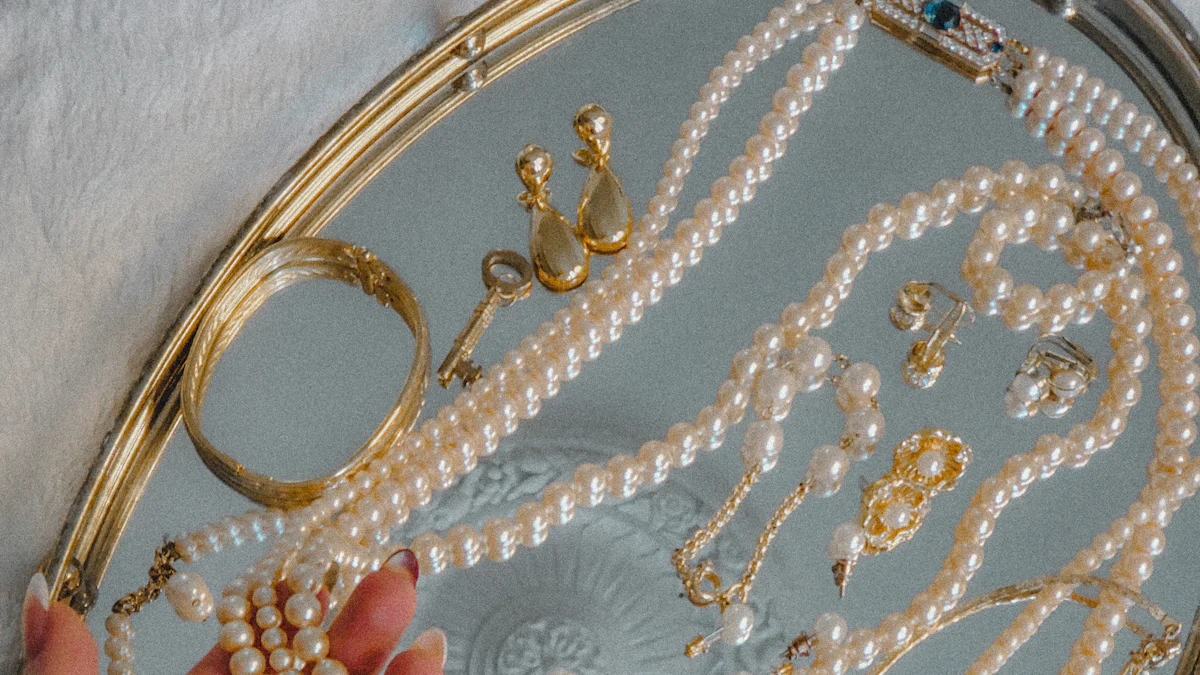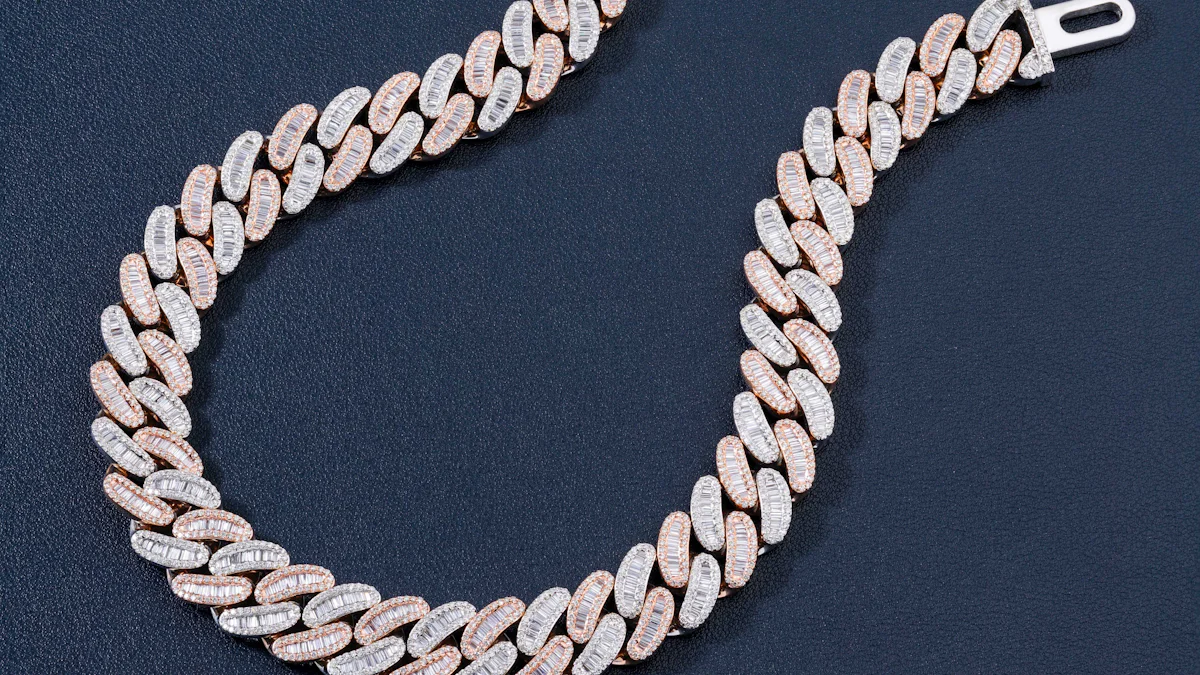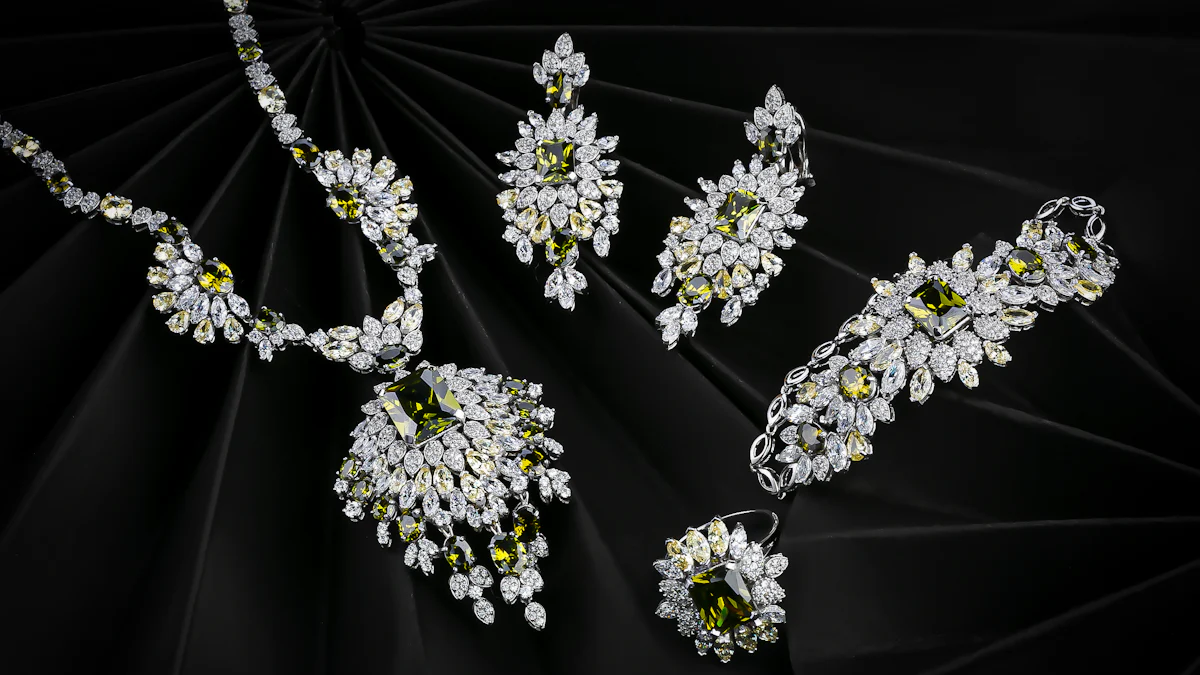Guide to Choosing a VVS Diamond Necklace

Choosing a VVS diamond necklace means opting for unmatched clarity and brilliance. You get a piece that sparkles with every movement, capturing attention effortlessly. VVS diamonds have very few inclusions, making them nearly flawless to the naked eye. Understanding this clarity level helps you make informed decisions. You ensure that your investment reflects quality and elegance. When you wear a VVS diamond necklace, you wear a symbol of luxury and sophistication. It's not just jewelry; it's a statement of style and discernment.
Key Takeaways
- VVS diamonds offer exceptional clarity and brilliance, making them a luxurious choice for jewelry.
- Understanding the difference between VVS1 and VVS2 diamonds helps you make informed decisions based on visibility and value.
- When budgeting for a VVS diamond necklace, consider factors like clarity grade, carat weight, and the quality of the cut and color.
- Choose a necklace that reflects your personal style, whether it's classic or modern, and consider the metal type for enhanced appearance.
- Always verify the authenticity of your VVS diamond with certification from a reputable gemological institute.
- Think about the resale value of your necklace; VVS diamonds typically retain their value well due to their rarity and quality.
- Consult with a jeweler specializing in VVS diamonds for expert advice tailored to your preferences and budget.
Understanding VVS Clarity

When you dive into the world of diamonds, clarity becomes a crucial factor. VVS diamonds, or Very Very Slightly Included diamonds, stand out due to their exceptional clarity. These diamonds have minute inclusions that are nearly impossible to detect, even under 10x magnification. This clarity enhances their brilliance and sparkle, making them a top choice for those seeking a stunning piece of jewelry.
What is VVS Clarity?
VVS clarity refers to diamonds with very, very slight inclusions. These inclusions are so tiny that even skilled graders find them challenging to spot under magnification. The Gemological Institute of America (GIA) assigns clarity grades based on the number, size, color, and placement of these inclusions. The fewer and less visible the inclusions, the higher the clarity grade. This means a VVS diamond necklace will appear flawless to the naked eye, offering a near-perfect visual appeal.
Differences Between VVS1 and VVS2
Within the VVS clarity grade, diamonds are further categorized into VVS1 and VVS2. The primary difference lies in the visibility of inclusions:
-
VVS1 Diamonds: These have inclusions that are extremely hard to see, even under 10x magnification. Typically, these inclusions are located on the pavilion, or bottom, of the diamond, making them less noticeable.
-
VVS2 Diamonds: While still possessing exceptional clarity, VVS2 diamonds have inclusions that are slightly easier to detect under magnification. These inclusions might be larger or darker and are often located closer to the table, the diamond's top facet.
Both VVS1 and VVS2 diamonds appear flawless to the naked eye. However, the subtle differences in inclusion visibility can affect their value. A VVS1 diamond, with fewer and less visible inclusions, may command a higher price than a VVS2 diamond. When choosing a VVS diamond necklace, understanding these distinctions helps you make an informed decision, ensuring your investment reflects both quality and elegance.
Cost Implications of VVS Diamonds
When you're considering a VVS diamond necklace, understanding the cost implications is crucial. VVS diamonds, known for their exceptional clarity, often come with a higher price tag. Let's explore what influences these costs.
Pricing of VVS Diamonds Per Carat
The price of VVS diamonds per carat can vary significantly. You might wonder why this is the case. Well, the clarity grade plays a big role. VVS diamonds have fewer and smaller inclusions compared to other clarity grades like VS (Very Slightly Included). This makes them more desirable and, consequently, more expensive.
-
VVS1 vs. VVS2: A VVS1 diamond typically costs about 10% more than a VVS2 diamond. This is because VVS1 diamonds have even fewer visible inclusions, making them appear more flawless.
-
VVS vs. VS: When comparing VVS diamonds to VS diamonds, you can expect VVS diamonds to be priced higher. Sometimes, the difference can be significant, especially if the diamonds have similar cut, color, and carat weight.
The price also depends on other factors like color and cut quality. A well-cut, colorless VVS diamond with a high carat weight can be particularly expensive. So, when you're budgeting for a VVS diamond necklace, consider these aspects to get a clearer picture of the potential costs.
Factors Affecting the Price of VVS Diamonds
Several factors influence the price of VVS diamonds. Understanding these can help you make an informed decision:
-
Clarity Grade: As mentioned earlier, the clarity grade is a major factor. VVS diamonds, with their minimal inclusions, command higher prices than diamonds with lower clarity grades.
-
Carat Weight: Larger diamonds are rarer and more valuable. A VVS diamond with a higher carat weight will generally cost more.
-
Color and Cut: The color and cut of a diamond also affect its price. A colorless diamond with an excellent cut will be more expensive. These qualities enhance the diamond's brilliance and appeal.
-
Market Demand: The demand for VVS diamonds can also impact their price. These diamonds are highly sought after for their clarity and brilliance, making them a symbol of luxury.
When you're choosing a VVS diamond necklace, keep these factors in mind. They not only affect the price but also the overall quality and appearance of the diamond. By understanding these elements, you can make a choice that aligns with your budget and preferences.
How Diamond Clarity is Measured
Understanding how diamond clarity is measured can help you make informed decisions when selecting a VVS diamond necklace. Clarity plays a significant role in determining a diamond's quality and value. Let's explore the process and factors involved in measuring diamond clarity.
The 4Cs of Diamonds
When it comes to diamonds, the 4Cs are crucial: cut, color, carat, and clarity. Each of these factors contributes to a diamond's overall appearance and value. Clarity, in particular, refers to the presence or absence of internal and external flaws, known as inclusions and blemishes.
- Cut: This determines how well a diamond reflects light. A well-cut diamond sparkles brilliantly.
- Color: Diamonds range from colorless to having slight tints. Colorless diamonds are more valuable.
- Carat: This measures the diamond's weight. Larger diamonds are rarer and often more expensive.
- Clarity: This assesses the visibility of inclusions and blemishes. Higher clarity grades mean fewer imperfections.
The Gemological Institute of America (GIA) uses these 4Cs to grade diamonds. Clarity is evaluated by examining the diamond under 10x magnification. Experts look for the number, size, and location of inclusions. These factors determine the diamond's clarity grade.
The Role of Clarity in Diamond Grading
Clarity is a key factor in diamond grading. It affects both the diamond's appearance and its value. Here's how clarity plays a role in grading:
-
Inclusions and Blemishes: Experts assess the diamond for internal inclusions and external blemishes. They consider the amount, size, shape, position, and visibility of these imperfections.
-
Grading Process: Highly trained gemologists use microscopes to evaluate clarity. They assign a clarity grade based on the difficulty of spotting imperfections under 10x magnification.
-
Clarity Grades: The GIA clarity scale ranges from Flawless (no inclusions or blemishes visible under 10x magnification) to Included (inclusions visible to the naked eye). VVS diamonds fall near the top of this scale, with very, very slight inclusions that are hard to detect.
"Clarity is one of the main factors determining the quality and value of diamonds."
When you choose a VVS diamond necklace, you're opting for a piece with exceptional clarity. Understanding how clarity is measured helps you appreciate the quality of your investment. You can confidently select a necklace that reflects both elegance and sophistication.
Selecting a VVS Diamond Necklace

Choosing the perfect VVS diamond necklace involves more than just picking a pretty piece. You want a necklace that not only looks stunning but also reflects your personal style and meets your quality expectations. Let's dive into some tips and considerations to help you make the best choice.
Tips for Choosing the Right Necklace
-
Understand Your Style: Think about the occasions you'll wear the necklace. Do you prefer something classic or modern? A simple solitaire pendant might suit everyday wear, while an intricate design could be perfect for special events.
-
Consider the Metal: The metal of the necklace can enhance the diamond's appearance. White gold or platinum complements the brilliance of VVS diamonds, while yellow gold offers a warm contrast.
-
Focus on the Diamond's Cut: The cut of the diamond affects its sparkle. A well-cut diamond will reflect light beautifully, making your necklace shine. Look for cuts like round, princess, or emerald, which are popular for their brilliance.
-
Check the Chain Length: The length of the chain can change the look of the necklace. A shorter chain keeps the diamond close to the neckline, while a longer chain offers a more relaxed style.
-
Seek Expert Advice: Consult with a jeweler who specializes in VVS diamonds. They can provide insights into the best options based on your preferences and budget.
"VVS diamonds are a great choice for those who yearn for a sparkle that matches their love. These high-clarity diamonds are eye-clean, meaning no inclusions are visible to the naked eye." — Bengarelick, Diamond Expert
Considerations When Purchasing
-
Budget Wisely: VVS diamond necklaces can be pricey due to their exceptional clarity. Set a budget that aligns with your financial situation and stick to it.
-
Verify Authenticity: Ensure the diamond comes with a certification from a reputable gemological institute. This guarantees the quality and authenticity of your VVS diamond necklace.
-
Evaluate the Setting: The setting should securely hold the diamond while enhancing its beauty. Prong settings allow more light to pass through the diamond, increasing its sparkle.
-
Think About Resale Value: While you may not plan to sell your necklace, it's wise to consider its resale value. VVS diamonds typically retain their value well due to their rarity and quality.
-
Customization Options: Many jewelers offer customization. You can choose the diamond shape, metal type, and design to create a unique piece that truly reflects your style.
By keeping these tips and considerations in mind, you can confidently select a VVS diamond necklace that not only dazzles but also holds personal significance. Remember, this necklace is more than just an accessory—it's a reflection of your taste and elegance.
Choosing a VVS diamond necklace is a decision that reflects your appreciation for elegance and sophistication. These diamonds, with their minimal inclusions, offer unmatched clarity and brilliance. They enhance any outfit with their captivating beauty. When selecting your necklace, consider your personal style, budget, and the quality of the diamond. Remember, a VVS diamond is not just a piece of jewelry; it's an investment in luxury and a statement of your unique taste. By understanding these aspects, you ensure your purchase is both informed and rewarding.
FAQ
What are VVS Diamonds?
VVS diamonds, or "Very Very Slightly Included" diamonds, represent one of the highest clarity grades available. These diamonds have minor inclusions that are nearly impossible to see, even under magnification. Their exceptional clarity makes them a popular choice for those seeking a dazzling piece of jewelry. VVS diamonds exude elegance and sophistication, adding a touch of class to any outfit.
How much is a VVS diamond chain?
The price of a VVS diamond chain can vary based on several factors. While VVS diamonds are not the most expensive, they aren't the cheapest either. Typically, these chains are crafted from gold or platinum to enhance durability and protect the gemstones. To estimate the cost accurately, consider the diamond's carat weight, the metal used, and the overall design of the chain.
Why choose VVS diamonds for jewelry?
VVS diamonds possess a captivating beauty that enhances the overall aesthetic of any jewelry piece. Their clarity allows the true brilliance of the diamond to shine through, making them a symbol of luxury and style. Whether set in a classic solitaire or an intricate vintage design, VVS diamonds perform beautifully, ensuring they shine brightly in any setting.
Are VVS diamonds real?
Yes, VVS diamonds are real and highly valued for their clarity and rarity. The term "VVS" signifies that these diamonds have very slight inclusions, which are difficult to identify even with magnification. This clarity grade makes them a popular choice for beautiful jewelry, including engagement rings and wedding necklaces.
What should I consider when buying a VVS diamond necklace?
When purchasing a VVS diamond necklace, consider factors such as your personal style, the metal type, and the diamond's cut. Ensure the diamond comes with a certification from a reputable gemological institute to verify its quality. Additionally, think about the chain length and setting style to ensure the necklace complements your wardrobe and personal taste.
Can VVS diamonds be used in various jewelry settings?
Absolutely! VVS diamonds are versatile and perform beautifully in various settings. From classic solitaires to intricate vintage designs, their exceptional clarity ensures they shine brightly, regardless of the setting. This versatility makes them an excellent choice for different types of jewelry, including necklaces, rings, and earrings.
Do VVS diamonds retain their value?
VVS diamonds typically retain their value well due to their rarity and high clarity. When considering resale value, it's essential to ensure the diamond is well-maintained and comes with proper certification. While you may not plan to sell your necklace, knowing it holds its value can provide peace of mind.
How do I verify the authenticity of a VVS diamond?
To verify the authenticity of a VVS diamond, ensure it comes with a certification from a reputable gemological institute, such as the Gemological Institute of America (GIA). This certification provides details about the diamond's clarity, cut, color, and carat weight, confirming its quality and authenticity.
See Also
How To Find The Ideal Artificial Diamond Bracelet
A Comprehensive Approach To Picking A White Diamond Ring
Tips For Selecting The Ultimate Women's Diamond Ring

